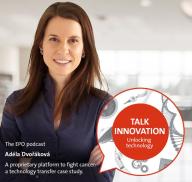
Two scientists-turned-entrepreneurs have created the technology platform S-TIR for immunology vaccines, enabling treatments for allergies and cancer.
Renewable energy systems like wind power plants are heavily reliant on sensors for their smooth autonomous operation.

One of the most exciting developments in surgery being seen today is the application of augmented reality.
3D printing, or additive manufacturing, is already disrupting prototyping and production in many fields.
The speed, weight and power of the latest e-bikes can surprise many riders – they need better brakes.

This is the remarkable story of how four female researchers from a Turkish university laboratory secured market success for their new product to treat chronic wounds.

Stress-induced urinary incontinence affects almost 400 million people worldwide. A novel device to treat this condition through electro-stimulation of muscles was developed by researchers at University College Dublin (UCD) and Bio Medical Research (BMR) in Ireland.

Following research at the Chalmers University of Technology (Sweden), the start-up company Oxeon was founded in 2003 to commercialise an innovative textile production process.
